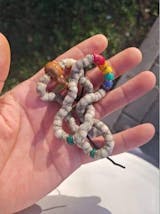A Thangka is a traditional Tibetan Buddhist painting on cotton or silk, typically depicting deities, spiritual figures, and symbolic scenes. Thangkas often feature intricate details and vibrant colors. They are used for meditation, teaching, and devotional purposes.
This mandala features the most famous Eight Auspicious Symbols of Mahayana and Vajrayana Buddhism known as Ashtamangala with golden mantras and red background around it.
Asthamangal are a set of eight auspicious symbols that hold significance in various Eastern spiritual traditions, particularly in Buddhism. These symbols are believed to represent different aspects of spiritual and worldly well-being. They are often considered to bring positive energy and blessings mantra is a sacred word, sound, or phrase often used in meditation, prayer, and spiritual practices. The mantra used in this context is a specific chant or sequence of words associated with the Asthamangal symbols. A mandala is a geometric and symbolic design that represents the universe, wholeness, and the interconnectedness of all things.
Asthamangal Mantra Mandala Thangka is a traditional Tibetan Buddhist painting that combines these elements into a unified artwork. The painting features the eight auspicious symbols arranged in a mandala pattern, with a mantra associated with the symbols woven into the design. This type of Thangka is used for meditation, reflection, and devotional purposes within the context of Eastern spiritual practices.
Mantra Mandala is encircled by Tibetan universal peace Mantra “Om Mani Padme Hum”. Om Mane Padme hum means jewels in the lotus with various petals consisting good luck, peace, power, and protection. Om Mani Padme Hum is the iconic/chanted mantra in Buddhism. Portrayed of six syllables it has the potential to bless the heart and the mind of the practitioner.
Om is the sound or “oscillation” of the entire universe. This sound is the most crucial of all. In the circumstances of chanting and mantras, it aids to destroy attachments to ego and establish generosity.
Ma removes jealousy and establishes ethics.
Ni removes desire and establishes patience.
Pad removes prejudice and establishes perseverance.
Me removes possessiveness and establishes concentration.
Hum removes hatred and establishes wisdom.















